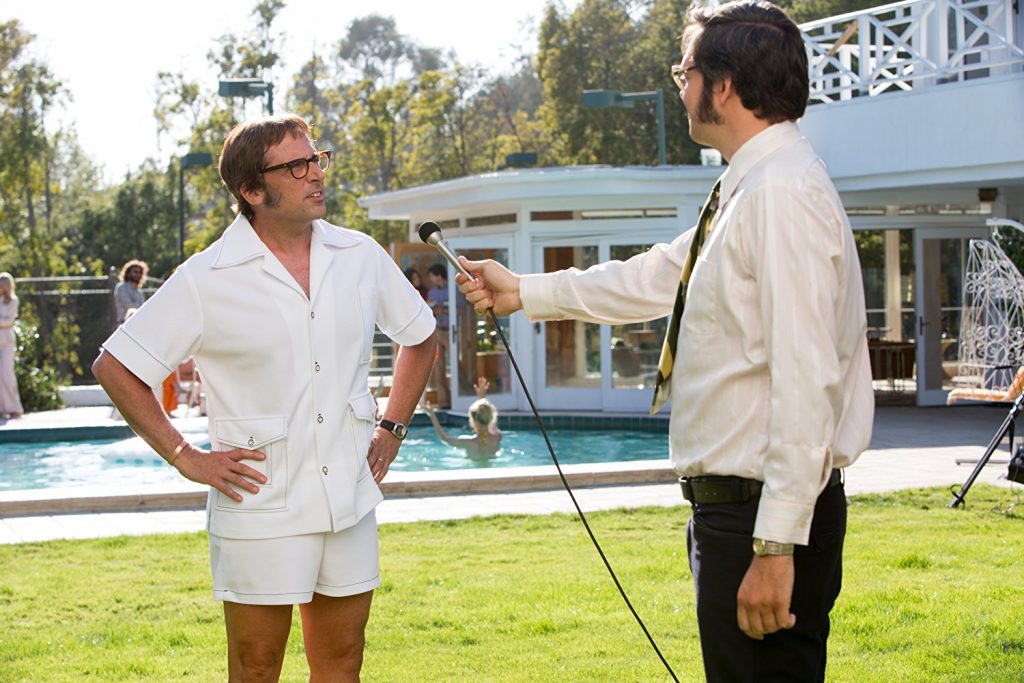Audiences across the world hoped “Battle of the Sexes” would offer a positive perspective on gender equality, but this movie is a sorry bait and switch. Johnathan Dayton and Valerie Faris’ “Battle of the Sexes” is a hypocritical look at modern day USA through the perspective of a warped and considerably forgettable biopic. There are three reasons why viewers should not watch this movie in theatres: “Battle of the Sexes” suffers from hypocritical writing, condoned destructive language, and the confusion of lust with love.
“Battle of the Sexes” often claims it supports gender equality, and features both a strong female and male protagonist. The movie, however, favors the male character over the female. It hides this truth by convincing audiences the female is more important.
Male tennis star Bobby Riggs is engagingly illustrated as an egotistical husband with a good heart and a loud mouth. He is a flawed character with a gambling problem and his sons do not look up to him as a role model. By the time Riggs challenges King to an exhibition match, audiences know exactly why he wants to prove himself to his wife and his sons. The match, for him, is nothing personal against King.
Women’s tennis champion Billie Jean King’s character is illustrated through her lesbianism and her desire to be a great tennis player. During the movie’s first hour and a half, these two elements are King’s only defining characteristics. After her first night with her lover, Marylin, King states she is going to become the best tennis player, so she can show up the men who told her she could not. This makes King’s overarching goal, and reason for challenging Riggs, simple revenge.
The writing hypocritically shows King as an emotional and unbalanced women, while Riggs is an in-control, overly positive showman. By the time the battle between King and Riggs begins, audiences may find themselves rooting for the misogynistic showman, which should be this movie’s opposite intent.
What makes this hypocrisy worse is that it inaccurately depicts these characters’ real life relationship. According to historyvhollywood.com, King and Riggs “never hated each other before the match and became quite close after.” In an interview with ABC news King states Riggs “was one of [her] heroes. [She] stayed in touch with Bobby. The night before he passed away [she] talked to him…[She] told him [she] lov
ed him and he told [her] he loved [her].”
In the movie, as well asin real life, Riggs makes loud misogynistic remarks. All of his comments are met with laughter and possible approval by the other characters. This can lead audiences to believe that there is no harm in saying such statements as, “I love women in the kitchen and in the bedroom.” To illustrate the hurtful impact of these comments, the movie should have had a moment where Riggs is told his comments are hurtful and rude.There are moments where it appears King criticizes his remarks, but she is laughing along with all his jokes. It almost gives off the appearance that she approves of his destructive language.

In addition to this, “Battle of the Sexes” never refers to Riggs as a misogynist, a far more poignant description of his showman persona. The movie has no problem referring to King as a feminist, a single-gendered adjective, but it refers to Riggs as a chauvinist, a gender neutral adjective.
“Battle of the Sexes” shows a lustful relationship between King and Marylin, but it claims it is a loving one. After King gets her hair done by Marylin, they meet up again about a month later. After an evening at a nightclub, Marylin comes back to King’s room, and the two of them engage in sexual activities. This is a contrived relationship built on coincidences and overheated passions.
After their night together, King takes a car ride to her next game with Marylin. King says Marylin needs to leave, because she will distract her from her game. Marylin says she won’t be a bother, and then begins to flirt with King while she is driving. Not only could Marylin’s selfish actions ruin King’s emotional state, but she could also cause King to accidentally drive off the road.
Beyond this, King is married to Larry King (not that one; a different one). Whether King’s love for Marylin is genuine and a little rushed, or they are both acting on selfish dangerous desires, King is cheating on her husband. King’s relationship with Marylin should be shown as a flaw in her character, but the movie instead shows it as heroic.
“Battle of the Sexes” had the potential to shine necessary light on gender differences and promote equality and empathy, but it squandered this opportunity. There have been recent film releases that promote gender equality and empathy (“Fences,” “Hidden Figures,” “La la Land” and “Rogue One” to name a few). “Battle of the Sexes” could have done the same as these films, maybe even more, but not if it favors one gender and only topically portrays the other.

